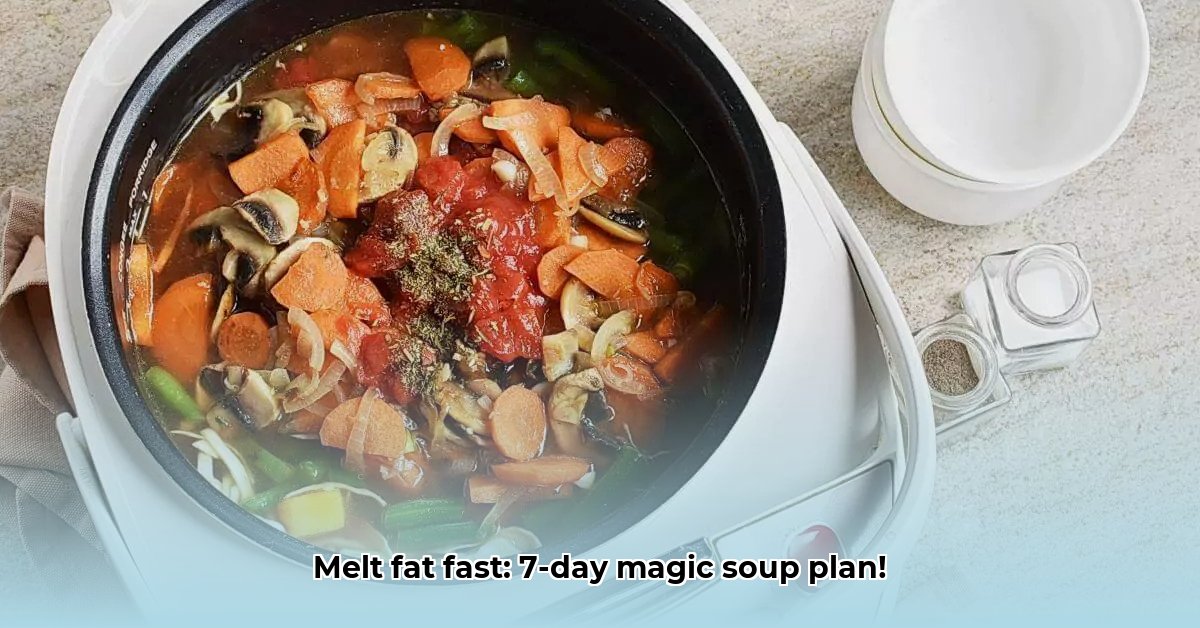
Weight Loss Magic Soup Diets: A Critical Review
The internet is awash with "magic soup" recipes promising rapid weight loss. This review examines two popular 7-day plans, one from FavFamilyRecipes and another from MexicoBariatricCenter, to determine their efficacy and safety. While both emphasize low-calorie, high-fiber soups, we'll analyze their claims, potential risks, and long-term sustainability. We'll help you decide if these plans fit your needs and health goals.
Recipe Summaries and Comparative Analysis
Both plans utilize low-calorie soups rich in fiber. FavFamilyRecipes offers a flexible approach, allowing ingredient substitutions, while MexicoBariatricCenter provides a stricter, pre-defined 7-day menu. However, neither plan presents robust scientific evidence supporting its weight-loss claims. Crucially, independent verification of calorie counts is absent in both.
The FavFamilyRecipes plan prioritizes variety and customization, potentially promoting adherence. The MexicoBariatricCenter plan, conversely, features a rigid structure, which may appeal to those seeking a regimented approach but might hinder long-term compliance. Both plans, though, lack rigorous scientific backing to support their weight-loss claims. Is it really a matter of choosing between a structured plan with high adherence barriers and a more flexible approach with potential for nutritional imbalance?
Evidence Spectrum and Risk Assessment
While both plans incorporate elements generally associated with healthy weight loss—reduced calorie intake and increased fiber—the lack of strong scientific evidence is a significant concern. Claims of rapid weight loss should be viewed with skepticism. Dr. Anya Sharma, Registered Dietitian at the Cleveland Clinic, cautions, "Weight loss should be a gradual process. Rapid weight loss often leads to yo-yo dieting and can negatively impact your overall health.”
The following risk assessment matrix highlights potential problems:
| Risk Factor | Probability | Severity | Mitigation Strategies |
|---|---|---|---|
| Nutritional deficiencies | Moderately Likely | High | Consult a registered dietitian; supplement with a balanced diet including essential nutrients. |
| Yo-yo dieting | Very Likely | Moderate | Focus on sustainable lifestyle changes and gradual weight management. |
| Unsustainable approach | Very Likely | Moderate | Incorporate soup into a broader healthy eating plan; avoid viewing it as a quick fix. |
| Misinformation | Moderately Likely | Low | Verify information from reliable sources like the NIH or Mayo Clinic. |
Actionable Intelligence and Recommendations
Consult a Healthcare Professional: Before starting any weight loss plan, consult your doctor or a registered dietitian to ensure it aligns with your individual health needs and goals. This is paramount, especially for individuals with pre-existing health conditions.
Prioritize a Balanced Diet: Don't rely solely on soup. Include a variety of nutrient-rich foods to avoid nutritional deficiencies. A registered dietitian can help you create a balanced meal plan that incorporates soup appropriately.
Focus on Sustainable Habits: Long-term weight management relies on consistent healthy habits, not fleeting trends. A sustainable approach combines balanced nutrition, regular exercise, and mindful eating.
Be Wary of Unrealistic Claims: Remember, there are no "magic" solutions for weight loss. Be critical of claims that promise rapid, unrealistic results.
Conclusion: Sustainable Weight Loss Requires a Holistic Approach
While these soup diets might offer short-term weight loss for some, they lack robust scientific backing and pose several risks. A sustainable and healthy weight-loss journey requires a balanced approach that encompasses diverse nutrition, regular physical activity, and mindful eating habits. Always prioritize your overall health and consult with qualified professionals before embarking upon any restrictive diet. Trustworthy information from reliable sources, like the National Institutes of Health (NIH) and the Mayo Clinic, should always guide your decisions.